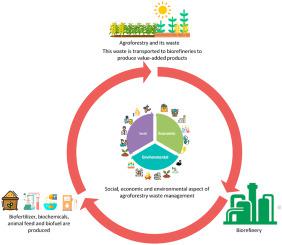Chemosphere ( IF 8.1 ) Pub Date : 2021-09-22 , DOI: 10.1016/j.chemosphere.2021.132321 Juhi Gupta 1 , Moni Kumari 2 , Arti Mishra 3 , Swati 1 , Mohd Akram 4 , Indu Shekhar Thakur 1

|
Agroforestry, an integration of farming system with woody perennials leads to the generation of potential agroforestry residues. The conventional treatment of agroforestry waste includes landfilling, thermal management, and decomposition which is accompanied with their own share of disadvantages. The ample amount of residues and products needs effective management to reap the economic and environmental benefits. The channel of waste collection, transportation, and recycle or valorization into products like biofuel, fertilizers, biochar, industrial chemicals is essential to maintain a circular sustainable bioeconomy. Global market value of biowaste to bioenergy (BtB) technology is roughly US $25.32 billion and is projected to enhance to US $40 billion by 2023. Employment of an appropriate pretreatment technology such as fermentation, hydrolysis, gasification etc. is going to elevate the degree of valorization along with surpassing the mobilization barrier. The sustainability assessment of the management process can be achieved with multiple models including technoeconomic analysis, life cycle assessment and multi criteria approach which are dependent on both hard and soft indices. Additionally, the loopholes of the agroforestry sectors would be managed by the introduction of appropriate policies which are undertaken globally by the Orlando and Lugo declarations, food and agriculture organization, Millennium Development Goals, Global Research Alliance and Guidelines for Sustainable Agriculture and Rural Development. The present review envisaged the agroforestry waste management strategy and its sustainability assessment primarily based upon Social, Economic and Environmental parameters without tormenting the future generations.
中文翻译:

农林废弃物管理——综述
农林业,农作系统与多年生木本植物的整合导致潜在的农林业残留物的产生。农林业废物的常规处理包括填埋、热管理和分解,这伴随着它们各自的缺点。大量的残留物和产品需要有效的管理才能获得经济和环境效益。废物收集、运输和回收或转化为生物燃料、化肥、生物炭、工业化学品等产品的渠道对于维持循环可持续生物经济至关重要。生物废物转化为生物能源 (BtB) 技术的全球市场价值约为 253.2 亿美元,预计到 2023 年将增加到 400 亿美元。 采用适当的预处理技术,如发酵、水解、气化等将随着超越动员障碍而提升价值化程度。管理过程的可持续性评估可以通过多种模型来实现,包括技术经济分析、生命周期评估和依赖于硬指标和软指标的多标准方法。此外,农林业部门的漏洞将通过引入由奥兰多和卢戈宣言、粮食和农业组织、千年发展目标、全球研究联盟和可持续农业和农村发展准则在全球范围内采取的适当政策来管理。本次审查设想了农林业废物管理战略及其主要基于社会、











































 京公网安备 11010802027423号
京公网安备 11010802027423号